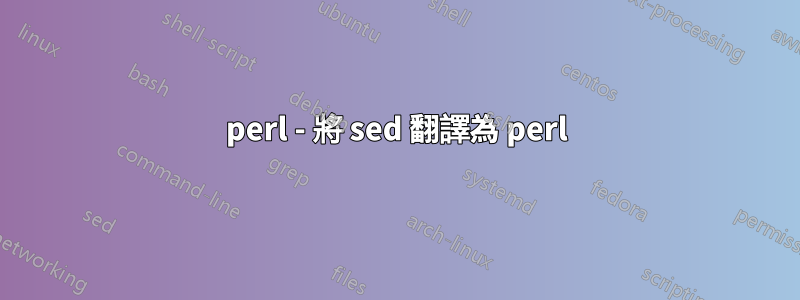
以下命令在 Solaris 上運作良好(僅當最後一個字元為“:”時刪除行)
sed -e '/:$/d' < foo > foo.new
如何在 perl 中做同樣的事情? (原因是因為我不想建立新文件)
perl -i -pe 's/:$/d' foo
Substitution replacement not terminated at -e line 1.
答案1
類似:
perl -ne '印出除非/:$/'
perl -ne '印出如果!/:$/'
perl -ne '!/:$/ && 印出'
請注意,兩者都透過建立臨時檔案並替換原始檔案來運作sed -i。perl -i如果您也想避免這種情況,請使用ed:
編輯文件 <<'EOF' 克/:$/天 瓦克 EOF
答案2
Perl 隨附一個 sed-to-perl 翻譯器,s2p。只是為了興趣,s2p '/:$/d'給:
#!/usr/local/bin/perl -w
eval 'exec /usr/local/bin/perl -S $0 ${1+"$@"}'
if 0;
$0 =~ s/^.*?(\w+)[\.\w+]*$/$1/;
use strict;
use Symbol;
use vars qw{ $isEOF $Hold %wFiles @Q $CondReg
$doAutoPrint $doOpenWrite $doPrint };
$doAutoPrint = 1;
$doOpenWrite = 1;
# prototypes
sub openARGV();
sub getsARGV(;\$);
sub eofARGV();
sub printQ();
# Run: the sed loop reading input and applying the script
#
sub Run(){
my( $h, $icnt, $s, $n );
# hack (not unbreakable :-/) to avoid // matching an empty string
my $z = "\000"; $z =~ /$z/;
# Initialize.
openARGV();
$Hold = '';
$CondReg = 0;
$doPrint = $doAutoPrint;
CYCLE:
while( getsARGV() ){
chomp();
$CondReg = 0; # cleared on t
BOS:;
# /:$/d
if( m /:$/s )
{ $doPrint = 0;
goto EOS;
}
EOS: if( $doPrint ){
print $_, "\n";
} else {
$doPrint = $doAutoPrint;
}
printQ() if @Q;
}
exit( 0 );
}
Run();
# openARGV: open 1st input file
#
sub openARGV(){
unshift( @ARGV, '-' ) unless @ARGV;
my $file = shift( @ARGV );
open( ARG, "<$file" )
|| die( "$0: can't open $file for reading ($!)\n" );
$isEOF = 0;
}
# getsARGV: Read another input line into argument (default: $_).
# Move on to next input file, and reset EOF flag $isEOF.
sub getsARGV(;\$){
my $argref = @_ ? shift() : \$_;
while( $isEOF || ! defined( $$argref = <ARG> ) ){
close( ARG );
return 0 unless @ARGV;
my $file = shift( @ARGV );
open( ARG, "<$file" )
|| die( "$0: can't open $file for reading ($!)\n" );
$isEOF = 0;
}
1;
}
# eofARGV: end-of-file test
#
sub eofARGV(){
return @ARGV == 0 && ( $isEOF = eof( ARG ) );
}
# makeHandle: Generates another file handle for some file (given by its path)
# to be written due to a w command or an s command's w flag.
sub makeHandle($){
my( $path ) = @_;
my $handle;
if( ! exists( $wFiles{$path} ) || $wFiles{$path} eq '' ){
$handle = $wFiles{$path} = gensym();
if( $doOpenWrite ){
if( ! open( $handle, ">$path" ) ){
die( "$0: can't open $path for writing: ($!)\n" );
}
}
} else {
$handle = $wFiles{$path};
}
return $handle;
}
# printQ: Print queued output which is either a string or a reference
# to a pathname.
sub printQ(){
for my $q ( @Q ){
if( ref( $q ) ){
# flush open w files so that reading this file gets it all
if( exists( $wFiles{$$q} ) && $wFiles{$$q} ne '' ){
open( $wFiles{$$q}, ">>$$q" );
}
# copy file to stdout: slow, but safe
if( open( RF, "<$$q" ) ){
while( defined( my $line = <RF> ) ){
print $line;
}
close( RF );
}
} else {
print $q;
}
}
undef( @Q );
}
答案3
如果最後一個字元是“:”則刪除行
perl -i -nle'/:$/||print' myfile
perl -i -nle'print unless /:$/' myfile #same thing
去http://perldoc.perl.org/perlrun.html有關 -i -n -l 和 -e 的解釋。


